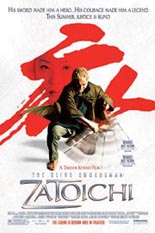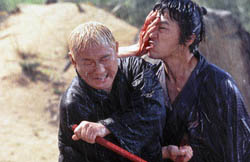
 The Blind Swordsman: Zatoichi, Takeshi “Beat” Kitano’s brilliant update of the enduring Japanese cult hero, is quite an achievement — not just for the writer/director/actor, but contemporary Asian cinema as a whole. All too often in the continent’s genre pictures, arguably even more so than America’s dumbest rock-’em-sock-’em blockbusters, the story takes such a backseat to the action — if there’s even a story for starters — that it renders itself impenetrable or invisible.
The Blind Swordsman: Zatoichi, Takeshi “Beat” Kitano’s brilliant update of the enduring Japanese cult hero, is quite an achievement — not just for the writer/director/actor, but contemporary Asian cinema as a whole. All too often in the continent’s genre pictures, arguably even more so than America’s dumbest rock-’em-sock-’em blockbusters, the story takes such a backseat to the action — if there’s even a story for starters — that it renders itself impenetrable or invisible.
With wave-of-the-hand ease, the 2003 Zatoichi could have done the same thing, lazily relying on its target audience’s fond memories of the character as shorthand (as he has no fewer than two dozen features built around him, starting with The Tale of Zatoichi in 1962 and later followed by a popular television series). Instead, Kitano (perhaps best known on these shores as the teacher of 2000’s Battle Royale) first infused the character with a real emotional pull and then fashioned a plot around it that fits as well as a sword in its custom sheath.
 More or less homeless, the aging masseur Zatoichi wanders village to village, coming upon a farming community where he settles with a kind family. He soon finds enemies, however, at the local gambling parlor. As the title reveals, Zatoichi may be blind, but wields a mean sword — as swift as it is sharp — only when he needs to. And when he does, the combat is brief — a few seconds and it’s over; no massive, Kill Bill-style set pieces as showdowns to be found here.
More or less homeless, the aging masseur Zatoichi wanders village to village, coming upon a farming community where he settles with a kind family. He soon finds enemies, however, at the local gambling parlor. As the title reveals, Zatoichi may be blind, but wields a mean sword — as swift as it is sharp — only when he needs to. And when he does, the combat is brief — a few seconds and it’s over; no massive, Kill Bill-style set pieces as showdowns to be found here.
What really makes this Blind Swordsman adventure work with Greenwich Mean Time precision is Kitano’s utterly charming and even funny performance. He’s wholly winning. I loved the film so much that even its decision to end in a musical number failed to change my mind. Hell, it even cemented it. —Rod Lott
